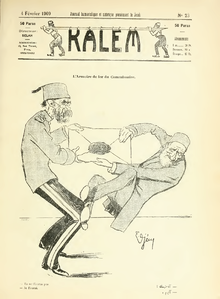Cemil Cem
Cemil Cem (* 1882 in Constantinople , Ottoman Empire (now Istanbul ), † April 9, 1950 in Istanbul; full name Mehmed Cemil Cem ) was a Turkish diplomat , caricaturist and editor .
Live and act
Cemil Cem studied at the School of Law ( Mekteb-i Hukuk ) in Istanbul. From 1903 he was Chancellor of the Ottoman Consulates of Nice and Toulon . On the personal recommendation of the Ottoman ambassador , he was transferred to Paris , where he also continued his law studies. In 1909 he was transferred to Vienna and in 1910 to Rome . There he became a close confidante of the ambassador and later Grand Vizier İbrahim Hakkı Bey , who had been one of his law professors in Istanbul.
In 1910, Cem retired from foreign service to fulfill his long-cherished desire to publish a satirical magazine. After Cem had already drawn caricatures for the satirical magazine Kalem from October 1908 in Paris and then in Vienna until September 1909 , he founded the satirical magazine Cem in Istanbul in November 1910 , which existed until 1912 after the Balkan Wars . He went to Europe again and only returned to Istanbul during the Turkish Liberation Wars .
From 1921 to 1925 Cem was director of the Sanayi-i Nefise Mektebi (today's Mimar Sinan University ) in Istanbul. From 1927 to 1929 he again published the satirical magazine Cem . As a publisher, he was convicted in 1927 based on a caricature of his colleague Recep Peker, who criticized the tax system in a caricature. Cem was sentenced to a year in prison, but was acquitted in the appeals court. His work, as editor and caricaturist, was unimpressed by authorities and authorities, and influenced subsequent generations of Turkish cartoonists.
Cem spent the last phase of his life painting in oils. He died in Istanbul in 1950.
literature
- Tobias Heinzelmann: The Balkan Crisis in the Ottoman Caricature. The satirical magazines Karagöz, Kalem and Cem 1908–1914. Orient Institute of the German Oriental Society, Istanbul 1999, (commissioned by Franz Steiner Verlag Stuttgart), pp. 87f., ISBN 3-515-07604-2
| personal data | |
|---|---|
| SURNAME | Cem, Cemil |
| ALTERNATIVE NAMES | Cem, Mehmed Cemil |
| BRIEF DESCRIPTION | Turkish diplomat, cartoonist and editor |
| DATE OF BIRTH | 1882 |
| PLACE OF BIRTH | Constantinople , Ottoman Empire |
| DATE OF DEATH | April 9, 1950 |
| Place of death | Istanbul , Turkey |
